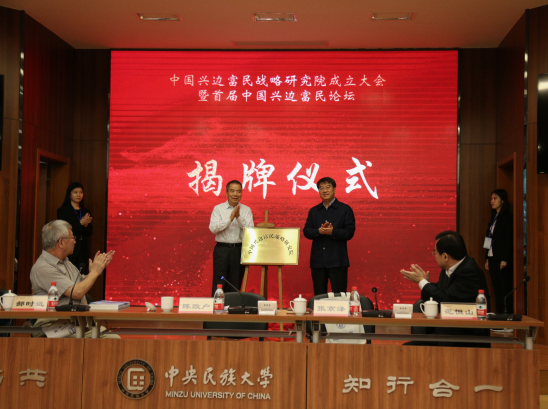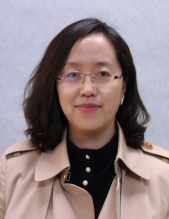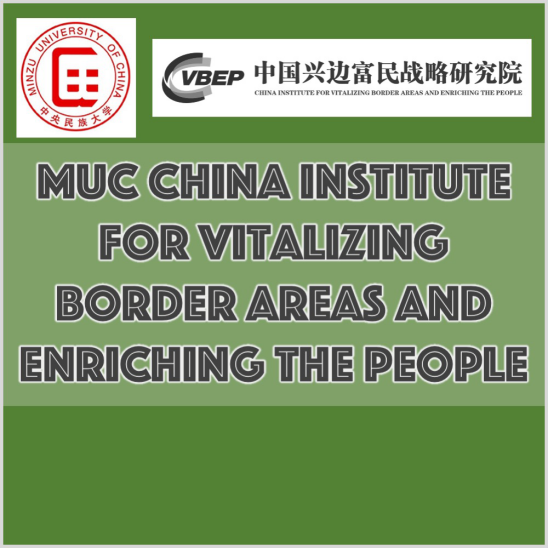School Overview & Development History
The MUC China Institute for Vitalizing Border Areas and Enriching the People was jointly established by the Economic Development Department of the State Ethnic Affairs Commission, the Department of Education and Technology, and Minzu University of China. It is a high-end think tank approved by the State Ethnic Affairs Commission and its office address is located at the Minzu University of China. Under the guidance of Xi Jinping’s Thought on Socialism with Chinese Characteristics for a New Era, the China Academy of Strategy for Rejuvenating Frontiers and Enriching the People fully implements the spirit of the 19th National Congress of the Communist Party of China, the spirit of the Central National Work Conference and the central government’s spirit of in-depth promotion of the spirit of action to rejuvenate borders and enrich the people, so as to build a community of Chinese people awareness as the main channel of development. The institute aggregates various research forces based on national strategies. It is committed to studying various problems encountered in the development of border areas and strives to build a platform for theoretical research, strategic consulting, high-end forum carriers, social service platforms, data information centers and more. Multi-functional high-end think tanks can better serve the major strategic needs of the party and the country on border governance and border area development issues, provide strong support for the overall development of border areas, and provides solidarity to the Chinese ethnic minority nationality communities.
The institute was jointly established by the China State Ethnic Affairs Commission’s Economic Development Department and the Education & Technology Department alongside Minzu University of China. It is a high-end think tank approved by the State Ethnic Affairs Commission. the University. The official English name of the institute, as stated above, is the "China Institute for Vitalizing Border Areas and Enriching the People", or VBEP as an acronym.

Facilities
The Research Institute has formed a trinity development model of "Headquarters-Branches-Bases", setting up branches, research bases and fixed observation points in nine border provinces. At present, the Inner Mongolia Branch of the China Academy of Strategies for Prospering Frontiers and Enriching People (Inner Mongolia Normal University) has been established, and research bases and fixed observation points have been established in Horgos City, Xinjiang and Qushui County, Tibet.

The Headquarters of the Research Institute is located at Minzu University of China. It formulates long, medium, and short-term research goals and tasks according to the Research Institute'sInstitute's construction goals and concepts. It builds the overall framework and key strategic research tasks on rejuvenating the border and enriching the people. The branch is set up in the provinces and regions involved in the strategic plan to rejuvenate the border and enrich the people and select universities and research institutions that have advantages in economic and social research in the border areas to set up branches.
The institute's branches include the Inner Mongolia branch that has been established, and the proposed Liaoning branch, Jilin branch, Heilongjiang branch, Guangxi branch, Yunnan branch, Tibet branch, Gansu branch, Xinjiang branch, and Hainan branch.
The base's construction establishes research observation points and research sites in 140 border counties and 45 border prefectures in the border areas through the cooperation model of institutions and enterprises. It serves as a research base for long-term observation and research of the main institute and branch of the research institute, forming a prosperous A comprehensive research system of macro, meso, and micro levels of a strategy to enrich the people the border.
At present, the research institute is actively promoting the construction of branches and research bases. The development model framework of the research institute "main institute-branch institute-base" will be gradually completed and become an important cornerstone of the institute's development.
School Focus, Beliefs & Development Objectives
The Institute is guided by Xi Jinping’s thoughts on socialism with Chinese characteristics in the new era, based on national strategy, with "rejuvenating the border and enriching the people" as its characteristic research field. It will continue to serve as a high-end think tank built by integrating resources and forces from all walks of life.
The institute was established in April 2019, with the goal of creating a “theoretical research highland, a key town for decision-making consultation, a high-end forum carrier, a social service platform, and a border data center”, based on the overall layout of the “five in one”, serving the national strategy and serving the border regional economic and social development as well as opening to the outside world.

Our Talent

• Zhang Zhigang (Director of the Economic Development Department of the State Ethnic Affairs Commission)
• Tian Liangang (Director of the Education and Technology Department of the State Ethnic Affairs Commission)
• Zhang Lijun (Dean of the School of Economics and Second-level Professor of Minzu University of China) Executive Dean
• Huang Taiyan (President and Senior Professor of Minzu University of China)
Huang Taiyan, the former president of Minzu University of China, is currently the Dean of our institute. He is a senior professor, a doctoral supervisor, and an expert enjoying special allowances from the State Council. He has been a visiting scholar at the University of Southern California and the University of Michigan in the past. He is the Chief Expert of Central Marxist Theoretical Research and Construction Project, Member of the 7th State Council Discipline Review Group and a representative of the 12th National People's Congress. He is Secretary-General of the National University "Socialist Economic Theory and Practice" Annual Conference, and President of the China Economic Development Research Association. His main research direction encompasses the contemporary Chinese Marxist political economy. He has published more than 60 books and more than 450 papers. He has won more than 30 awards for teaching and research achievements. He has presided over more than 50 national social science key projects, major research projects of the Ministry of Education, and horse engineering projects. He has also presided over several planning projects commissioned by ministries and local governments.
Academic Exchanges and Cooperation at Home and Abroad
At present none.
Introducing a Few of Our Institutes Professors
Guo Lihua (郭利华), Han Ethnicity

About
Guo Lihua is from Hohhot, Inner Mongolia, and is a MUC Professor and also Executive Director of Beijing Finance Society.
Experience
• 2005.7 Teacher in the Finance Department, School of Economics, Minzu University of China
• 2001.9-2004.7 Ph.D. in Economics, School of Economics, Renmin University of China
• 2009.12-2014.12 School of Finance, Central University of Finance and Economics, Postdoc
• 2013.4-2013.10 International Business School, University of South Australia, Australia, Visiting Scholar
• 2015.2-2015.5 School of Oriental and African Studies (SOAS), University of London, UK, Visiting Scholar
Research Interests
Financial development and anti-poverty, financial technology, and inclusive finance.
Courses
• Finance
• Financial Marketing
Representative Academic Achievements
She has been published in CLC web, Cultura and other A&HCI source journals, "Guangming Daily" (Theoretical Edition), "International Financial Research", "Comparative Educational Research", "Journal of Central University for Nationalities", NPC photocopying newspapers and periodicals "Finance and Insurance" and other magazines or More than 30 articles have been reprinted. She also published two academic monographs and co-authored two.
She presided over several topics, including the National Social Science Fund Project, the Higher Education Department of the Ministry of Education, the Industry-University Cooperation and Collaborative Education Project, the State Ethnic Affairs Commission's Research Project on Ethnic Issues, and the China Association for Science and Technology Commission.
Teaching Awards
[1] First Prize of Teaching Achievement of Minzu University of China (2017)
[2] Classroom Teaching Effect Award of Minzu University of China (2018)
More Information Available At: https://vbep.muc.edu.cn/info/1058/1268.htm
Zhang Chunmin (张春敏), Han Ethnicity
Vice Dean, Professor, and Doctoral Supervisor
Ph.D. Economics

About
He was born in 1972 in Qinglong, Hebei. At present, he is Vice Dean, Professor, and Doctoral Supervisor at the MUC School of Economics. His main research direction is contemporary Chinese economy and economic development in ethnic minority areas. He mainly teaches courses such as "Macroeconomics," "Contemporary Chinese Economy," "Political Economics Methodology"; published more than 50 articles in "Chinese Administration," "Teaching and Research" and other journals; wrote "Research on the Economic System of Ethnic Regions" and more than 10 monographs. He presided over and participated in more than 20 various topics. He has won the Fok Yingdong Education Foundation Outstanding Young Teacher Award of Higher Education and the National Civil Affairs Commission Social Science Outstanding Achievement Award. He engages in part-time social work is the executive vice-chairperson of the Capital Economist Forum, executive director of the Chinese Minority Economic Research Association and director of the World Political Economic Association.
More Information in Chinese: https://vbep.muc.edu.cn/info/1058/1265.htm
Yu Xiao (于潇) , Han Ethnicity
Professor of Economics
Master Degree Tutor

About
He is of the Han nationality and is a native of Changchun, Jilin Province. He is an associate professor, master advisor and was recognized as a young/middle-aged talent by the State Ethnic Affairs Commission.
Education Background
He has studied political economy at Peking University starting in September of 2009, and received his Ph.D. in Economics in June 2013. In June of 2011, he was awarded a full scholarship by the Belgian government titled the "Sandwich Grant." Between February 2012 and February 2013, he undertook a joint doctoral training in Economic History at the Faculty of Philosophy and Art in Ghent University, Belgium. He has also served as a tenured professor at the University of Tehran and later received a doctorate in history from Ghent University (joint). Since July 2018, he has been engaged in postdoctoral research at Tehua Postdoctoral Research Station (Beijing).
Work Experience
2013.7-2018.12: Lecturer, Department of Environment, School of Life and Environmental Sciences, Minzu University of China
2019.1-Present: Minzu University of China, School of Economics, Department of International Economics and Trade, Associate Professor
Research Areas
• Research on the Changes and Performance of Agricultural Land System
• Research on Social Network and Intergenerational Mobility
• Research on household registration system reform
• Natural resource management (woodland, grassland, minerals)
• Corporate portrait and macro industry evaluation
Courses Taught
• Environmental Economics
• Financial Marketing
• Natural resource management
Main Works
Has published more than 20 papers in SSCI, national authoritative, CSSCI, and Chinese core journals, and served as an anonymous reviewer for various authoritative SSCI and well-known CSSCI journals such as "Land Use Policy," "Social Indicators Research," "Finance Research." Presided over and participated in several national, provincial, and ministerial-level scientific research projects, and participated in the compilation of the "White Paper" of government technology and finance in many places and the "Blue Book" series published by the Social Science Literature Press.
Specific Representative Results (in the past five years):
[1] Yu, Xiao, and Wang, Xuelong* (2018). Will Social Networks Become Less Important? Applied Economics Letters, 25:16, 1117-1120. (SSCI)
[2] Yu Xiao, Peter Ho. Will non-agricultural household registration make people happier[J]. Statistical Research, 2016,10:67-74 (National Authoritative Academic Journal)
[3] Yu Xiao, Peter Ho. Real estate, land, and farmers' non-agricultural management behavior selection——An empirical analysis based on the data of Chinese household dynamic tracking survey[J]. Journal of Shanghai University of Finance and Economics, 2015, 1:65-73 (CSSCI )
Awards
• In July 2019, he was selected into the "National Ethnic Affairs Commission Young Talents Cultivation Program"
• In April 2019, won the A+ scientific research achievement award of Minzu University of China
• In January 2019, won the "2018 Special Contribution Award for Scientific Research Work" by Minzu University of China
More Information in Chinese: https://vbep.muc.edu.cn/info/1058/1272.htm
School Slogan
VBEP is an acronum for the China INstritute for Vitalizing Border Areas and Enriching the People.


Official Website: https://vbep.muc.edu.cn/index.htm